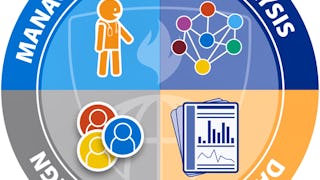Filter by
SubjectRequired
LanguageRequired
The language used throughout the course, in both instruction and assessments.
Learning ProductRequired
LevelRequired
DurationRequired
SkillsRequired
SubtitlesRequired
EducatorRequired
Explore the Systematic Review Course Catalog
 Status: Preview
Status: PreviewJohns Hopkins University
Skills you'll gain: Clinical Research, Qualitative Research, Data Synthesis, Scientific Methods, Research Methodologies, Data Collection, Quantitative Research, Risk Analysis, Statistical Methods, Statistical Analysis
 Status: Free Trial
Status: Free TrialSkills you'll gain: Good Clinical Practices (GCP), Informed Consent, Institutional Review Board (IRB), Clinical Research Ethics, Clinical Research Coordination, Clinical Research, Clinical Trials, Clinical Data Management, Drug Development, Patient Education And Counseling, Record Keeping, Clinical Documentation, Regulatory Compliance, Document Management, Health Equity, Electronic Medical Record, Patient Communication, Risk Management
 Status: Free Trial
Status: Free TrialJohns Hopkins University
Skills you'll gain: Clinical Data Management, Clinical Trials, Sample Size Determination, Clinical Research Ethics, Clinical Trial Management Systems, Clinical Research, Data Quality, Quality Assurance, Data Entry, Case Report Forms, Institutional Review Board (IRB), Good Clinical Practices (GCP), Data Cleansing, Data Management, Regulatory Compliance, Data Integrity, Statistical Reporting, Informed Consent, Clinical Documentation, Data Collection
 Status: Preview
Status: PreviewStanford University
Skills you'll gain: Grant Writing, Peer Review, Technical Writing, Technical Communication, Writing, Scientific Methods, Journals, Editing, Grammar, Research, Proofreading, Healthcare Ethics, Media and Communications
 Status: Preview
Status: PreviewUniversity of London
Skills you'll gain: Peer Review, Surveys, Timelines, Research, Writing
 Status: Preview
Status: PreviewJohns Hopkins University
Skills you'll gain: Clinical Trials, Clinical Research, Healthcare Ethics, Scientific Methods, Informed Consent, Ethical Standards And Conduct, Drug Development
What brings you to Coursera today?
 Status: Free
Status: FreeUtrecht University
Skills you'll gain: Epidemiology, Clinical Research, Medical Science and Research, Diagnostic Tests, Clinical Trials, Patient Evaluation, Public Health, Patient Treatment, Risk Analysis
 Status: Preview
Status: PreviewJohns Hopkins University
Skills you'll gain: Verification And Validation, Pharmacology, Environmental Science, Research, Safety Assurance, Scientific Methods, Biostatistics, Bioinformatics, Research Methodologies, Environmental Regulations, Research Design, Risk Analysis, Data Synthesis
 Status: Free Trial
Status: Free TrialAmerican Psychological Association
Skills you'll gain: Institutional Review Board (IRB), Data Visualization, Descriptive Statistics, Quantitative Research, Plot (Graphics), Data Literacy, Scientific Methods, Graphing, Research Design, Statistical Hypothesis Testing, Probability & Statistics, Research, Statistical Inference, Statistics, Statistical Analysis, Surveys, Sample Size Determination, Ethical Standards And Conduct, Data Analysis, Research and Design
 Status: NewStatus: Free Trial
Status: NewStatus: Free TrialSkills you'll gain: Storytelling, Writing, Journals, Content Creation, Peer Review, Journalism, Creativity, Mindfulness, Self-Awareness, Emotional Intelligence, Personal Development, Editing, Digital Publishing, Self-Discipline, Self-Motivation, Empathy, Overcoming Obstacles
 Status: Free Trial
Status: Free TrialWesleyan University
Skills you'll gain: Storytelling, Peer Review, Writing and Editing, Writing, Editing, Proofreading, Storyboarding, Content Creation, Constructive Feedback, Persistence, Professionalism, Creativity
 Status: NewStatus: Free Trial
Status: NewStatus: Free TrialCoursera Instructor Network
Skills you'll gain: Employee Retention, Talent Pipelining, Succession Planning, Workplace inclusivity, Performance Appraisal, Human Resource Strategy, Prompt Engineering, Mediation, Human Resources, Employee Engagement, Responsible AI, Generative AI Agents, Human Resources Information System (HRIS), AI Product Strategy, HR Tech, Payroll, Performance Review, Management Training And Development, Generative AI, Artificial Intelligence and Machine Learning (AI/ML)
Systematic Review learners also search
In summary, here are 10 of our most popular systematic review courses
- Introduction to Systematic Review and Meta-Analysis: Johns Hopkins University
- Clinical Trials: Good Clinical Practice: Novartis
- Clinical Trials Operations: Johns Hopkins University
- Writing in the Sciences: Stanford University
- Understanding Research Methods: University of London
- Design and Interpretation of Clinical Trials: Johns Hopkins University
- Clinical Epidemiology: Utrecht University
- Evidence-based Toxicology: Johns Hopkins University
- Psychological Research: American Psychological Association
- Creative Essay Writing: Explore the Personal & Powerful: Skillshare










